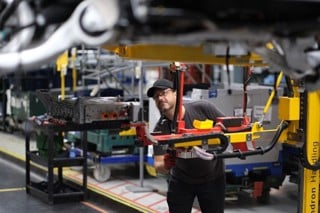MPs have raised concerns that the Vehicle and Operator Services Agency (VOSA) - responsible for enforcing safety standards for heavy goods vehicles (HGV) and public service vehicles (PSV) – may not be paying sufficient attention to the roadworthiness of big haulage firms by focusing instead on smaller operators who are more often non-compliant, but are less often on the road.
The MPs also raised concerns about the pace at which VOSA is introducing vehicle testing sites owned by the private sector (Authorised Testing Facilities). The way in which this is being done could potentially undermine the safety of HGVs on UK roads and be bad for businesses. Since 2010 VOSA has sought gradually to replace its own testing sites with Authorised Testing Facilities (ATFs) which are run by private sector owners but rely on VOSA's staff to carry out tests. The Committee broadly welcomed VOSA's approach to this transition but raised concerns over the pace of change, in particular VOSA's ability to provide testing staff to new ATFs and how it can ensure smaller operators have access to ATFs, especially in remote areas.
Introducing a report on the Work of the Vehicle and Operator Services Agency the Chair of the Transport Select Committee Louise Ellman MP said: “We believe that VOSA's road safety record is testament to the high standards of VOSA’s staff. We would not like to see this jeopardised by expanding the use of private ATFs too quickly.”
“We are not persuaded that testing staff should be employed directly by Authorised Testing Facilities but VOSA has an obligation to provide staff at the right places at the right times for the industry.”
“VOSA should also bear in mind that a testing market that rests exclusively on ATFs may not be in the best interests of business generally and the small operator in particular.”
The Committee welcomed VOSA’s success in enforcing roadworthiness standards for non-GB vehicles in recent years. However, the Committee is concerned at the number of drivers’ hours and tachograph offences that are being detected. This is a serious crime and the Committee supports proposals to make the prosecution of drivers’ hours offenders easier.
The report also raised concerns about VOSA's relationship with the Traffic Commissioners who rely on VOSA staff to monitor vehicle maintenance standards and bus services. In 2011, VOSA changed its approach to monitoring bus services by moving away from actively monitoring punctuality towards working with operators and local transport authorities on improving policy and processes. The inquiry heard that outside London, the only source of reliable data on punctuality is held by operators, but that there is often a reluctance to make this available to the Traffic Commissioners. The report recommends that the Government should step in, if necessary, to ensure the Traffic Commissioners' have access to this information.
The Committee also identified a number of communication problems between VOSA and the Traffic Commissioners and is concerned that the relationship may be undermining the Traffic Commissioner’s independence. The Committee recommended that the Government look at whether the Traffic Commissioners should have their own staff independent of VOSA.
Ellman added: “We were particularly concerned that problems relating to enforcement and resources which were raised by the Traffic Commissioners are not being properly addressed by VOSA.”
“This points to communications problems which should not exist if the right structures are put in place.”
The HGV Road User Levy Act provides for the introduction of an HGV road user levy from April 2014 to charge foreign hauliers to use UK roads. The Committee expects the levy to be implemented with wider enforcement concerns in mind, for example using it to monitor overseas vehicles in the UK more effectively. The Committee is concerned that enforcing the levy will impact on VOSA's other enforcement activities and has asked the Government to examine the case for using the proceeds of the levy to fund its enforcement and provide additional staff.





















Login to comment
Comments
No comments have been made yet.